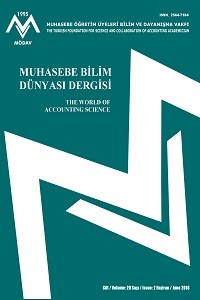Öz
This paper addresses the
complex global environment of accountancy education and focuses on the need for
coordination, especially among accounting academics. It enumerates and
discusses the forces for change in Accountancy Education in Developing
Economies. Attention is paid to benchmark accountancy education and to the
factors underlying professional judgment and qualifications. Finally, in
addressing the global infrastructure for accountancy education, attention is
paid to the efforts of organizations, including the work of the International
Association for Accounting Education and Research (IAAER) and the International
Accounting Education Standards Board (IAESB).
Anahtar Kelimeler
Kaynakça
- Reference 1. SEC, Securities and Exchange Commission, www.sec.gov Reference 2. IAESB, International Accounting Education Standards Board, International Federation of Accountants, Education, www.ifac.org Reference 3. IFAC, International Federation of Accountants, Education, Proposed IAESB 2010-2013 Strategy and Work Plan, www.ifac.org Reference 4. WTO, World Trade Organization, www.wto.org Reference 5. GATS, General Agreement on Trade in Services, www.wto.org Reference 6. GAE 2012 Dynamics of Global Accountancy Education Prof Dr G.H. Karreman Prof Dr J.G. Kuijl, RA Prof I.F.Y. Marrian, MA, CA A.M. Verweij, LL.M. page 85. Reference 7. UNCTAD, United Nations Conference on Trade and Development, ISAR, www.unctad.org/isar Reference 8. EU, European Union, Europa.eu/Information_en.htm FEE, Reference 9. Federation of European Accountants, www.fee.be FIDEF, Reference 10. International Federation of Francophone Accountants, www.fidef.org
Öz
Bu yazı muhasebe eğitiminin
karmaşık küresel ortamını ele alıyor ve özellikle muhasebe akademisyenleri
arasında koordinasyon ihtiyacına odaklanıyor. Gelişmekte Olan Ülkelerdeki
Muhasebe Eğitiminde değişim güçlerini sıralıyor ve tartışıyor. Kıyaslama muhasebe
eğitimine ve mesleki yargının ve niteliklerin altında yatan faktörlere dikkat
edilir. Son olarak, muhasebe eğitimi için küresel altyapıya değinirken,
Uluslararası Muhasebe Eğitim ve Araştırma Birliği (IAAER) ve Uluslararası
Muhasebe Eğitim Standartları Kurulu (IAESB) de dahil olmak üzere kuruluşların
çabalarına dikkat edilir.
Anahtar Kelimeler
Kaynakça
- Reference 1. SEC, Securities and Exchange Commission, www.sec.gov Reference 2. IAESB, International Accounting Education Standards Board, International Federation of Accountants, Education, www.ifac.org Reference 3. IFAC, International Federation of Accountants, Education, Proposed IAESB 2010-2013 Strategy and Work Plan, www.ifac.org Reference 4. WTO, World Trade Organization, www.wto.org Reference 5. GATS, General Agreement on Trade in Services, www.wto.org Reference 6. GAE 2012 Dynamics of Global Accountancy Education Prof Dr G.H. Karreman Prof Dr J.G. Kuijl, RA Prof I.F.Y. Marrian, MA, CA A.M. Verweij, LL.M. page 85. Reference 7. UNCTAD, United Nations Conference on Trade and Development, ISAR, www.unctad.org/isar Reference 8. EU, European Union, Europa.eu/Information_en.htm FEE, Reference 9. Federation of European Accountants, www.fee.be FIDEF, Reference 10. International Federation of Francophone Accountants, www.fidef.org
Ayrıntılar
| Birincil Dil | İngilizce |
|---|---|
| Konular | İşletme |
| Bölüm | ANABÖLÜM |
| Yazarlar | |
| Yayımlanma Tarihi | 22 Haziran 2018 |
| Gönderilme Tarihi | 23 Aralık 2017 |
| Yayımlandığı Sayı | Yıl 2018 Cilt: 20 Sayı: 2 |


